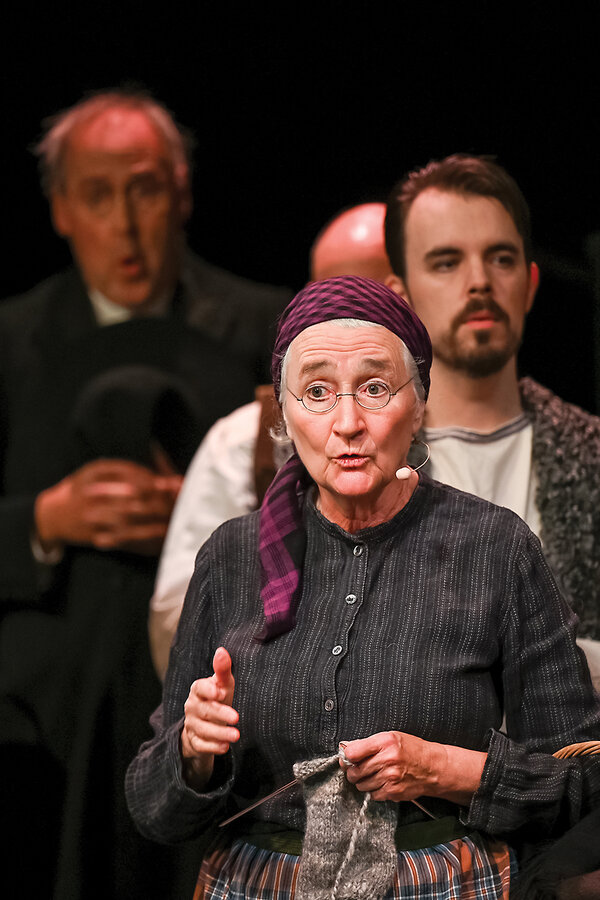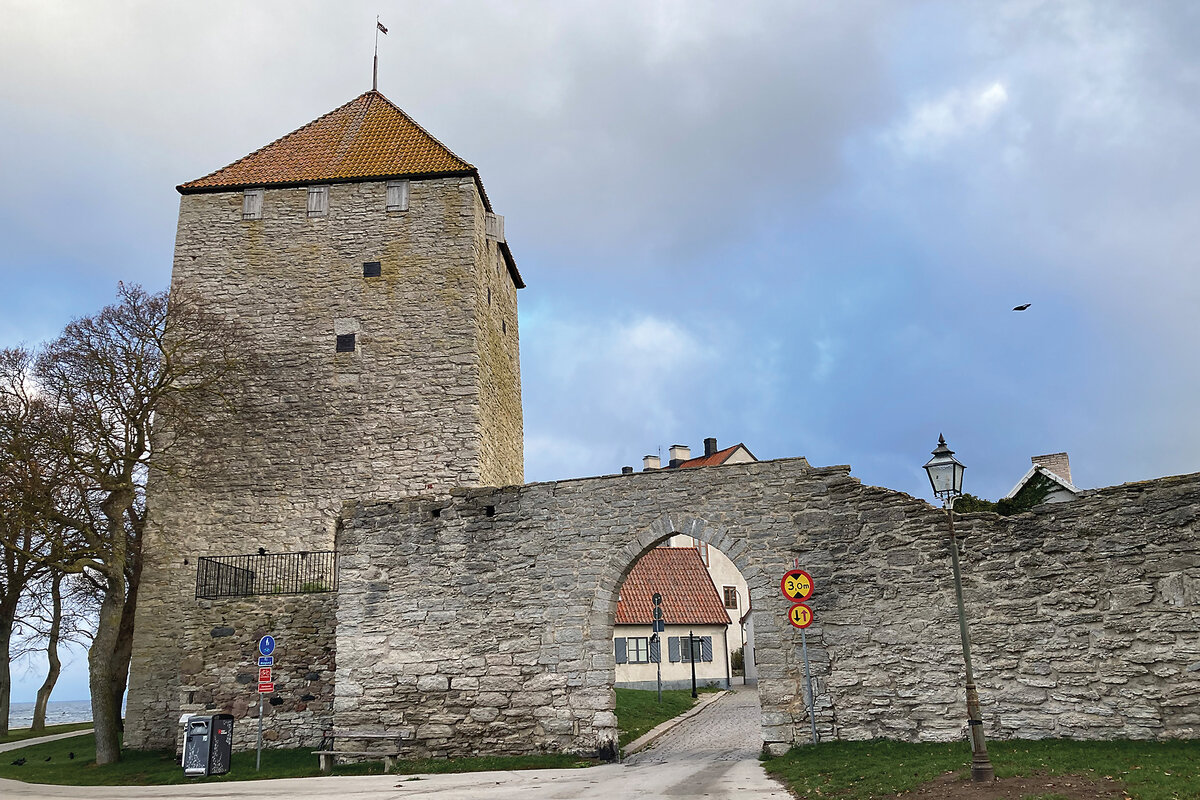Move over, Vikings. Sweden’s new seafaring heroes are knitting grannies.
Loading...
| Visby, Sweden
History is unavoidable on the Swedish island of Gotland, where the medieval walls of its capital, Visby, still stand. So it made sense that on Nov. 9, Allmänna Sången Visby, a local choir, celebrated a daunting sea voyage launched on that very day 200 years ago. “Samma Ull” (“We Are All Made of the Same Wool”) is a choir drama about knitters who sailed across the Baltic Sea to Stockholm, and how their courage and seaworthiness were tested. That’s right, knitters.
Gotland was known for its abundant wool and talented craftswomen. Two hundred years ago, there was no fast fashion. Knitters were as important as wool. They even had a name: tröjkällingar, or “sweater dears.” In fall, they sailed to Stockholm to sell their wares, bringing home cash and supplies in time for Christmas.
But in 1824, some sweater dears were lost at sea. Eva Sjöstrand wrote “Samma Ull” about them. She first found their story on two pages of a commemorative 1924 book by Nils Lithberg, a professor in Stockholm’s Nordic Museum. She was captivated.
Why We Wrote This
A story focused onWhat better way to tell a true holiday story than with singing – and knitting? In Sweden, an island choir comes together to celebrate community.
After further research and writing, and plenty of rehearsals, she now sings the part of Briten Granquist, who knitted 777 sweaters, hired a boat, and gathered sweater dears to join her.
As Ms. Sjöstrand began the project, Mats Hallberg, the conductor of the choir, said, “Are you crazy? Shall we sing about some old ladies going to Stockholm selling cardigans? What is this for a story?”
But Ms. Sjöstrand says, “It’s a fantastic story. You can place everything in it”: the doughty Gotlandic community; knitters who made more money than their husbands; the spirit that sent them onto the Baltic in cold winds and scant daylight. Most of all, it’s a fantastic story because they survived. Their boat was blown off course to Estonia, where they waited for wind. Families rejoiced on Christmas Eve, when mothers, daughters, grandmothers, and a fiancée they had mourned as lost sailed home.
In 75 minutes – in fluting, soaring voices, to music by Jan Ekedahl – 35 singers carry us to Stockholm and back. This choir doesn’t stand on risers. Under direction by Karin Kickan Holmberg, they sing about herding sheep, and then become them – circling, bent over, soprano voices suddenly baaing. In storms, everyone leans dramatically to one side – or over the rail. Also, they knit. They knit while singing, selling sweaters, or lurching onboard. “Most of us knit” anyway, one singer comments after the show. Two women singing the parts of Anna and Magdalena Norrby knit both ends of the same scarf. It brings out Ms. Sjöstrand’s theme for the choir drama. “I say it in my songs: We exist for each other.”
The song “Samma Ull,” declares, “Regardless whom I meet in life, we are of the same wool – we are all the same.” So many hands knitting create a sense of calm, steady progress. Clicking needles even serve as percussion. Is it difficult for the actors to knit and sing at the same time? “It calms you down when you’re waiting behind the curtains,” says Eva Flemming, who by day works for a Swedish partnership with Tanzania.
Choir members have been preparing for “Samma Ull” for months. “You go to rehearsal on Monday so tired, but afterwards, you’re dancing down the street to your car,” says Bengt-Olaf Grahn, an environmental engineer. Anna Jutehammar agrees. “It gives as much energy as it takes.” She treasures “being warm together and the equality in these dark times.” She is a journalist with Swedish Radio. “It’s a small island and everyone knows who you are but as a choir member it doesn’t matter what you do.”
“Choir singing is the most peaceful thing you can do,” Ms. Sjöstrand says. “You have to cooperate. If you are angry and having a fight, you can’t do anything good. You have to accept that people are different.” She has been a choir member since 1980. There are 11 choirs in Visby, and 30 choirs in all on Gotland, according to Camilla Ahlberg, vice chair of the island’s choir association, Gotlands Körförbund. One member remarks, “I want to live in the choir.”
Professor Lithberg’s two-page account noted only a few passengers on the ship, named The Three Brothers. “I don’t want to tell fantasy stories, so I had to find characters to fill the boat,” who would have lived at that time, Ms. Sjöstrand says.
Having written 23 books about Gotland, she was no stranger to historical research. And 34 years working at Swedish Radio gave her a reporter’s investigative chops. She found likely passengers in small-town parish records. Two formidable women – Briten and Cajsen, played by actor Lena Bogegård – in 19th-century garb and headscarves, with knitting needles clicking, welcome the audience. Both were real people. Briten was the champion knitter. Cajsen was the strongest woman on Gotland. She could carry four buckets of water, two yoked on her shoulders and one in each hand.
Parish records noted a young woman named Maria who donated 24 shillings to the church in Ojä, also on Gotland, after a trip to Stockholm. “And then I got it!” Ms. Sjöstrand snaps her fingers. “I got a bride.” In “Samma Ull,” Maria misses her Nov. 25 wedding date when The Three Brothers is becalmed in Estonia. She sings, “When I close my eyes, I can see my home, paths on the moor, the beach, stones, water, waves, and wind. I can see my longing.” Meanwhile, passengers ponder how to get the wind to blow. Maria vows to offer her shillings at church. Others pony up a silver coin for Visby Cathedral and a carved boat. The wind picks up.
Ms. Sjöstrand also researched handwritten notes by historian Pehr Säve, who interviewed Briten and another tröjkälling in 1860. An account of a grieving mother whose daughter arrived on Christmas Eve to say “I’m alive” became a scene.
When the choir drama was first coming together in 2019, she saw a problem. One character, Maria’s fiancé, Olof, stayed in Gotland. “But we can’t afford having a good tenor sitting idle, so the singer had to play another role.” Ms. Sjöstrand explains.
She searched for a family with a second son. A first son wouldn’t go to sea; he needed to survive to inherit the farm. She found Peter Jacob Jönsonn. She told the Olof of the 2019 cast that Peter was his other, onboard character. He replied, “Well, that’s good; he is my grandfather’s grandfather’s brother.”
She found a distant relative of her own who was a seaman at the time. He’s played by Mr. Grahn, the environmental engineer. The singers who now play Maria and Olof had seen the earlier version in 2019 on their first date. Commenting on all the coincidences, she says, “Someone out there is knitting for us.”
In the end, the ship returns. Maria and Olof are reunited. There’s Christmas rejoicing. The choir sings “Samma Ull,” walking forward to surround the audience members, who are tearing up. After applause and encores, it seems like every singer is being hugged. They are the audience’s neighbors, children, and co-workers. It’s a community affair, and it’s a community that also includes those who, 200 years ago, set out on the Baltic Sea with a lot of sweaters to sell.







